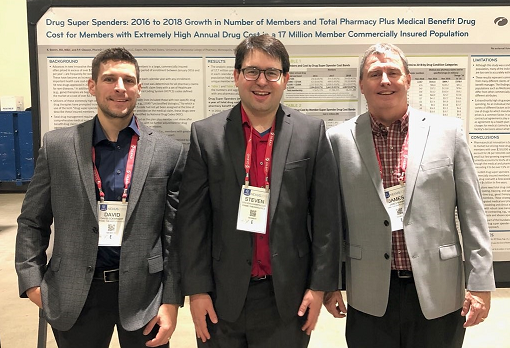Stories
It must be a record!
Prime’s health outcomes team presents seven posters at AMCP Nexus
November 8, 2019In a strong showing, Prime’s health outcomes team presented seven research posters at the conference in late October. “We are very appreciative to be recognized by AMCP with poster awards for the majority of our submissions this fall,” says Patrick Gleason, PharmD, assistant vice president, health outcomes team at Prime Therapeutics and AMCP board member. “The rigor of AMCP’s peer review process reinforces the integrity of our study methodology. Acceptance shows that the Academy sees the topics as relevant to the industry. And the awards give us better opportunities at the conference to talk to our peers about the research.”
Prime’s ability to draw insights from medical and pharmacy claims data is a key differentiator. The research demonstrates Prime’s unique total drug management approach and access to real-world evidence that allows for meaningful results.
Prime shows Drug Super Spender research during a poster session at AMCP
 Picture (left to right): David Eckwright, health outcomes research principal; Steven Champaloux, data scientist principal; James Burke, health outcomes research principal.
Picture (left to right): David Eckwright, health outcomes research principal; Steven Champaloux, data scientist principal; James Burke, health outcomes research principal.
Prime’s presented research
Platinum Award winner – podium presentation
Major finding: The study shows a ten-fold increase in the use of osimertinib (Tagrisso®) – an epidermal growth factor receptor inhibitor (EGFR-i) – since it became a guideline recommended first-line cancer therapy option in late 2017. These real-world findings of members with non-small cell lung cancer (NSCLC) treated with an EGFR-i show those taking Tagrisso® had a 50% higher total cost of care than those using competitor EGFR-i products, resulting in an additional $4 million in drug costs for payers over two years’ time.
Gold Award winners
Major finding: In the pharmacist call program, Medicare members’ adherence to their medicines improved following proactive phone calls from pharmacists informed by a predictive model. The program focused on members with diabetes, hypertension and high cholesterol.
Medicaid Missed Refill Letter Intervention Impact on Refill Rate versus Randomized Controls
Major finding: A Medicaid Missed Refill Program found that reminder letters drove a 14-18% higher rate of refilled prescriptions in three chronic drug therapy categories (depression, diabetes and asthma) over a randomized group of members who didn’t receive a letter.
Silver Award winner
Major finding: The study shows a sharp jump in the number of drug super spenders – members with pharmacy and medical drug therapy claims totaling $250,000 or more annually. With pharmaceutical manufacturers bringing more ultra-expensive treatments to market, Prime is using predictive analytics to identify the very small, but fast-growing group of drug super spenders to uncover savings opportunities and create optimal care strategies to better meet members’ and insurers (e.g., self-insured employers) needs and help control costs.
Additional research
Major finding: Prime researchers analyzed real-world use of the botulinum toxin (BT) Botox® (Onabotulinumtoxin A) and three other BTs approved to treat several movement disorders and found shifting treatments from Botox® to the equally effective, lower cost BT therapies would save an estimated $6.3 million annually.
Major finding: The study shows a rapid, increased use of three new medicines to prevent chronic migraines. However, each of these new calcitonin gene-related peptide (CGRP) receptor blockers carries a wholesale cost of approximately $600 per month, and CGRP drug costs are expected to reach $15 million per month by the end of 2020 – triple the cost seen in July 2019. One positive, this real-world study also showed a statistically significant decrease (5%) in the number of members with an opioid claim in the six months after starting CGRP therapy.
Short Acting Opioid Duration Edit Substantially Reduces Large Days Supply for Opioid Naive Members
Major finding: Alerts sent to pharmacies notifying them that insurance would cover no more than a 7-day supply for patients who were newly starting opioid therapy resulted in a decrease in patients receiving too much of the opioid drug.
For more of Prime’s research, go to Prime Insights research page.
Related news
Stories
July 22, 2024
Introducing the latest issue of our medical and pharmacy benefit management report
The summer 2024 issue of the Magellan Rx Report provides insights on the industry’s most groundbreaking managed care solutions in some of the most complex areas of health care
Stories
July 18, 2024
Specialty drug trend forecasted to drop for employer groups, clinical experts say
Introduction of Humira® and Stelara® biosimilars contribute to continued decline in the autoimmune – anti-inflammatory trend
Stories
July 16, 2024
Prime/Magellan Rx earns top score on the Disability Equality Index
For the second consecutive year, Prime Therapeutics/Magellan Rx Management received a score of 100 on the Disability Equality Index®, which benchmarks disability workplace inclusion